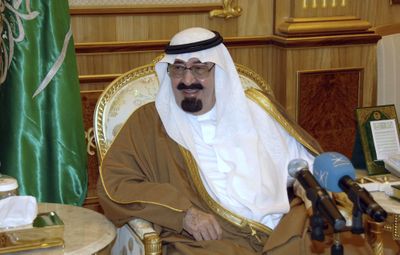Saudi king names female to new post
Key ultraconservative officials dismissed

CAIRO, Egypt – King Abdullah of Saudi Arabia weakened the hold of Islamic hard-liners Saturday by appointing the first female to a ministerial post and dismissing a leading fundamentalist cleric and the head of the nation’s powerful religious police.
The surprising government reshuffle indicated that the 84-year-old monarch was frustrated with the pace of reform in a kingdom uneasily balanced between moderates and ultraconservatives. By broadening the voices of modern Islamic thinkers, King Abdullah is trying to refashion the religious establishment at a time the country faces the global financial crisis and renewed threats from al-Qaida militants.
The king dismissed Sheik Ibrahim al Ghaith as head of the Commission of Virtue and the Prevention of Vice, overseer of the religious police who arrest people considered impure, such as women not properly veiled. The monarch also removed Sheik Saleh al Lihedan as chief of the country’s highest religious tribunal. In 2008, Lihedan issued a fatwa saying it was permissible to kill TV executives for broadcasting “evil” and immoral programs.
Noura al Fayez, an official at the Saudi Institute for Public Administration, was elevated to the new post of deputy minister of women’s education. The women’s education ministry is regarded as highly corrupt, and Al Fayez’s appointment appeared to be the king’s response to increasing lobbying from women’s rights groups to stem discrimination.
The reorganization included the naming of a new central bank director and new ministers for education, justice, health and information. In another sign the king was pushing for more openness within the country’s puritanical, Wahhabi brand of Islam, the Saudi Press Agency reported that the body of religious scholars, known as the Grand Ulama Commission, will be re-established and made up of more moderate Sunni clerics.
“It’s a positive sign, but it’s overdue and minor,” Mohammad Fahad al-Qahtani, an economics professor, talk show host and activist, said of the government restructuring. “But at least it’s bringing fresh blood into the system. … He can’t do it in drastic steps, although it’s much needed.”
Since coming to power in 2005, King Abdullah has been praised by moderates for taking steps to curtail the influence of ultraconservatives. But his supporters also have charged that, fearing a backlash from within the royal family, he has moved too cautiously. Saturday’s shake-up was strong evidence the king wants to cement a legacy as modernizer in a country that flogs people accused of blasphemy and denies women the right to vote.
King Abdullah recently started a series of judiciary reforms and is building a multibillion-dollar university that will rely on Western and international science programs and faculty. He also has called for increased tolerance between faiths.
But the king’s wishes don’t always result in religious and government hard-liners ceding turf. Human rights groups repeatedly criticize the country for torture and abuse, and it is still a crime in the kingdom to practice any religion other than Islam.